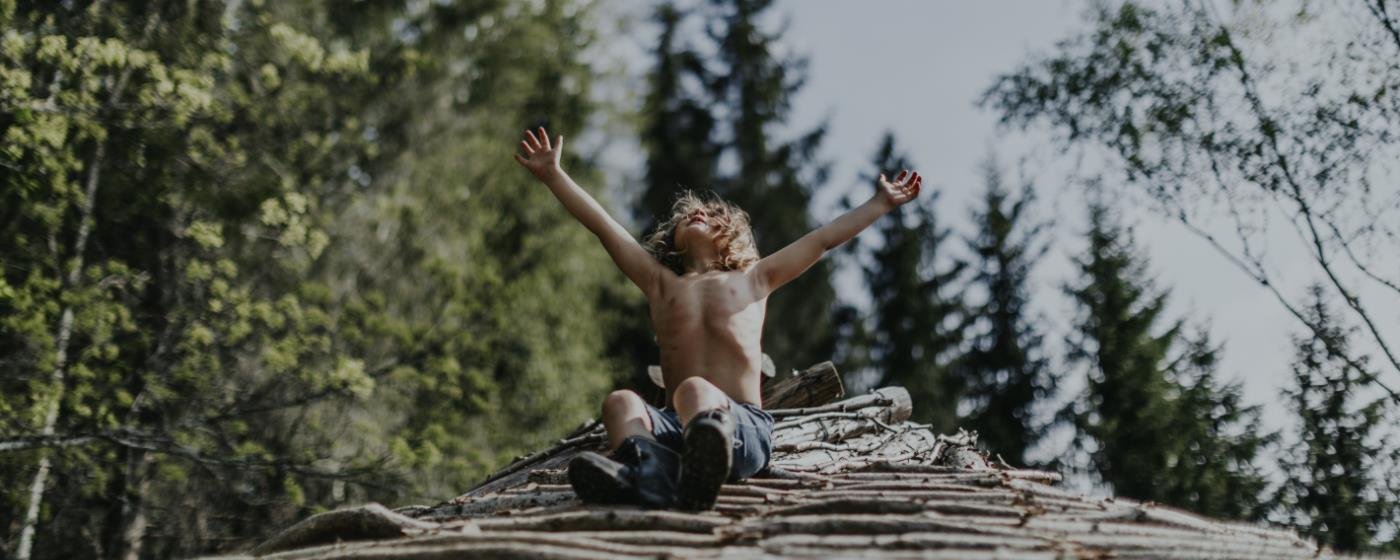A New Kind of Wilderness Review
The first few minutes of “A New Kind of Wilderness” seem to promise some kind of documentary advertorial for off-the-grid living. With her hippy-hunky husband Nik and their three cherubic children, camping, foraging for food and literally hugging trees in verdant Norwegian woodland, photographer Maria Vatne’s voiceover serenely extols the liberating virtues of “getting out of the rat race” and “being free and full of love.” It all looks lovely like “Swiss Family Robinson” updated for the era of Instagram cottage core and a cynic might say that it hardly seems sustainable. And indeed it isn’t, but not for the reasons you might guess: Mid-montage, Vatne’s voiceover goes silent, and the lifestyle photos give way to ones of her undergoing cancer treatment, before the family is shown without her altogether.
It’s an elegant bit of wrongfooting right upfront that signals that as is often the case with documentaries shot over a long timeframe “A New Kind of Wilderness” is not likely to be the movie director Silje Evensmo Jacobsen set out to make. What began in 2014 as a portrait of a bilingual Norwegian-British family abandoning social norms to live as closely as possible with nature changed course after Vatne’s untimely death in 2019 to become a film about what happens when you try (and fail) to raise your kids on hiking and home schooling alone.
How interesting or idealized Jacobsen’s initial conception might have wound up being is hard to say; either way it’s unlikely that it could have been more affecting than this one does, as it pokes gently but insistently into fragile family dynamics that can’t be repaired with any number of national parks or TreeHugger.com subscriptions. The result may not have enough barbed narrative hook or tricky structure to become a documentary conversation piece outside of its native Norway, where it premiered in the world documentary competition of this year’s virtual Tromso Film Festival. But it should be distributed on the strength of its aching emotional candor and continued visual beauty.
“When you choose a life that is so dependent on yourself, there’s a vulnerability there,” Maria says in one of her earlier interviews with Jacobsen which resurface over footage of family life without her, sometimes to poignantly ironic effect. She and Nik, an Englishman who happily left his homeland to pursue their joint dream of running a sustainable Scandi farm, never seemed that vulnerable together. As they bedded into the landscape and had three children together forming a contented blended family with Ronja, Maria’s daughter from a previous relationship they were strongly unified by their shared fixity of purpose and principle: to cause as little harm to the planet as possible and teach their children those values.
But without Maria around anymore, Nik has more vocal doubts about their mission. “Am I completely ruining my children’s lives here?” he wonders directly to camera; his and Maria’s resolve evaporates quickly once bereavement sets in. The younger three say they prefer it that way (and how many kids would pick the classroom over unfettered outdoor playtime or spontaneous weekday camping trips?), but Ronja increasingly feels out of place among them and decides to move in with her biological father in town, where she eventually wants to study nursing.
Ronja’s decision is particularly difficult for her little sister, Freja, who loves her more than anything else in the world. The idea that their insular rural paradise may contain something other than everything they need is beyond her at this point. But Nik can’t run the smallholding alone; to stay with him means returning to civilisation on his terms: working as a casual labourer and moving the family into a small house on another farm, where three days’ schooling a week are enforced by the local education board. This new setup is not a happy one; it feels like leaving behind yet another piece of Maria to be lost. As far as Nik’s concerned, he might as well sever all ties and move the family to England, “where I’m an alien”, but which his children regard as home.
Then time passes, and heals slowly or not grief may be forever but you can accommodate it; so much so that new rhythms bring solace and human contact, even if only fitfully. School may or may not take away “the wildness and playfulness within us” feared by Maria: certainly her own kids become more domesticated as they settle into school life, but not at the expense of their spirit. Ronja makes good with distance. Still, “A New Kind of Wilderness” remains true to its dead subject’s ideals; especially when the camera crew look around them with an organic sense of pine-fresh appreciation. And anyway society has value too, living further round this strange old world together is what its gentle observation of a family evolving tells us
Watch A New Kind of Wilderness For Free On Gomovies.


.jpg?w=1024&resize=1024,1024&ssl=1)
.jpg?w=1024&resize=1024,1024&ssl=1)
.jpg?w=1024&resize=1024,1024&ssl=1)
.jpg?w=1024&resize=1024,1024&ssl=1)
.webp?w=1024&resize=1024,1024&ssl=1)
.jpg?w=1024&resize=1024,1024&ssl=1)
.jpg?w=1024&resize=1024,1024&ssl=1)
.jpg?w=1024&resize=1024,1024&ssl=1)